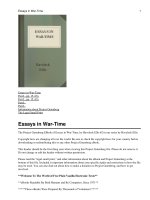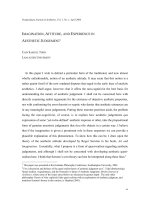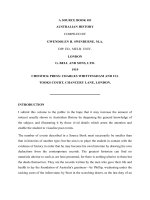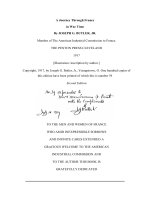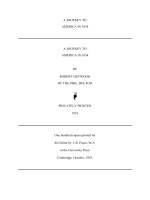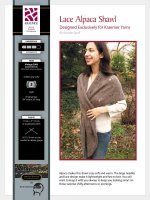A Journey Through France in War Time pptx
Bạn đang xem bản rút gọn của tài liệu. Xem và tải ngay bản đầy đủ của tài liệu tại đây (1.21 MB, 180 trang )
A Journey Through France
in War Time
By JOSEPH G. BUTLER, JR.
Member of The American Industrial Commission to France.
THE PENTON PRESS CLEVELAND
1917
[Illustration: inscription by author.]
Copyright, 1917, by Joseph G. Butler, Jr., Youngstown, O. One hundred copies of
this edition have been printed of which this is number 39
Second Edition
TO THE MEN AND WOMEN OF FRANCE
WHO AMID INEXPRESSIBLE SORROWS
AND INFINITE CARES EXTENDED A
GRACIOUS WELCOME TO THE AMERICAN
INDUSTRIAL COMMISSION AND
TO THE AUTHOR THIS BOOK IS
GRATEFULLY DEDICATED
CONTENTS
CHAPTER I
Origin of the Purpose of the Trip.
CHAPTER II
Crossing the Atlantic.
CHAPTER III
Bordeaux and Paris.
CHAPTER IV
Meeting England's Premier.
CHAPTER V
The Birthplace of Lafayette.
CHAPTER VI
A Great Munitions Plant.
CHAPTER VII
Art and Architecture of Aries.
CHAPTER VIII
Along the Mediterranean.
CHAPTER IX
Towns in Southern France.
CHAPTER X
The Creusot Gun Works.
CHAPTER XI
Approaching the Front.
CHAPTER XII
Within Sound of the Guns.
CHAPTER XIII
The Story of Gerbeviller.
CHAPTER XIV
On the Main Front.
CHAPTER XV
Reims and the Trenches.
CHAPTER XVI
Back to Paris.
CHAPTER XVII
On the Way Home—England.
CHAPTER XVIII
On the Broad Atlantic.
CHAPTER XIX
The French Steel Industry in War Time.
CHAPTER XX
Where War Has Raged.
CHAPTER XXI
General Joffre.
CHAPTER XXII
The Work of Reconstruction.
CHAPTER XXIII
French Business Organizations.
CHAPTER XXIV
The Carrel Method of Treating Wounds.
CHAPTER XXV
A City in an Army's Path.
CHAPTER XXVI
Some impressions of France and the French.
ILLUSTRATIONS
Most of the illustrations listed, which may be seen in the scanned
book at the Bibliotéque nationale de France site
( are not of adequate quality and have not been
included in this transcription.
(note of transcriber.)
Typical French Soldier in Uniform
Photograph of Commissioners, Taken on Train Leaving Paris for Limoges
The Author's Passport
Autograph Signatures of the Commission
Grand Theatre, Bordeaux. Closed Until the War Ends
Miniature French Flag Carried by the Author Through France. The Waving of This
Flag by an American Aroused Much Enthusiasm
Lloyd George, Who Says "England is Fighting a Battle for Civilization"
Miss Winifred Holt, "Keeper of the Light House of France"
Ancient Bridge at Limoges—
Built by the Romans Two Thousand Years Ago and Still
in Use
Tapestry Workers at Aubusson
Lafayette's Deathbed, With Commission's Flag and Flowers
Monastery of St. Michael, at le Puy
Silk Tapestry Menu Used at Dinner to the Commission at St. Etienne Col. Rimailho
With 155-mm. Gun (upper) and Famous 75-mm. Gun (lower) Perfected by Him
Women Employed in Munitions Factories
Arlesiennes—Types of Southern France
Old Roman Arena at Aries—Still Used for Bull Fights and Other Amusements
Shore of the Mediterranean Near Marseilles. In the distance Chateau D'If, Made
Famous by Dumas
Types From the French Provinces
Monastery of Chartreuse
New 520
-
mm. Gun, Carrying Projectile Seven Feet in Length and Weighing 3,100
lbs., Seen at Creusot Works
German Prisoners Passing Through the Village of St. Etienne
The Lion of Belfort
Battlefield of La Chipotte, Showing Monument and Markers on Graves
Ruins of Gerbeviller
Sister Julie
Cathedral at Nancy
German Trenches Captured by the French
The Reims Cathedral Before its Destruction
Ruins at Reims. Upper and Lower Plates—The Cathedral. Middle Plate—
The
Archbishop's Palace
Key of
Archbishop's Palace at Reims and Bone From Twelfth Century Tombs Opened
by German Shells
Trenches Visited by the Commission
King Albert's Address to the Belgians
Photograph of King Albert of Belgium, with the Royal Autograph
French Marines Operating 75-mm. Gun on Shipboard
Nancy
—Place Stanislas
Ruins of Village—St. Die
The Prefecture at Reims After Bombardment
Portrait in Tapestry—General Joffre
Ruins at Nancy
Trenches Occupied by French Soldiers
Proclamation Posted in Reims Just Before the French Fell Back to the Marne
Arrival of Wounded Soldiers at Chalons, on the Marne
Proclamation by the Mayor of Reims, Issued on the day the German
s Entered that
City, September 4, 1914
First Order From the Invaders
Second German Proclamation
Citizens Warned of Danger
Citizens Warned that Hostages May be Hanged
Postal-card Painted by Artist Soldier in French Trenches
FOREWORD
Of all that has been written, or is to be written, by Americans concerning the
tragedy overwhelming the Old World, much must naturally be descriptive of
conditions in France, since that country is, among those affected by military
occupation, most accessible and most closely in sympathy with American ideals and
American history.
While the ground covered by these pages may be, therefore, not unfamiliar, the
motives prompting their preparation are probably unique. It has been undertaken at the
request of friends, but not entirely for their pleasure; since the author hopes that those
who read it may see in the patriotic devotion and courage of the French people
something of the spirit that should animate our country, whose aspirations toward
liberty the French aided even before they were themselves free.
Written in hours snatched for the task amid the press of other duties, these pages
endeavor to present a simple, intimate and personal story of experiences enjoyed and
impressions gained under most unusual circumstances and herein shared with my
friends as one of the most interesting incidents of a long and busy life.
A Journey Through France in War Time
CHAPTER I.
ORIGIN OF THE PURPOSE OF THE TRIP
N the Autumn and Winter of 1915, a body of distinguished and
representative Frenchmen visited the United States, their object being to make an
investigation of conditions here, having in mind the great need of France in war
munitions, the steel in ingot and bar form very much needed for the manufacture of
war materials, and the numerous other commodities necessary for prosecution of the
war, which had been in progress more than a year.
The finances of France were also very much in evidence in the minds of the visitors.
The names and occupation of this French Trade Commission appear following:
Chairman—Monsieur Maurice Damour,
o Secretary of the French Deputies' Commission on Appropriations.
Monsieur Jacquez Lesueur,
o Delegate of the Ministry of Agriculture.
Monsieur L. Trincano,
o Director of the Horological School of Besancon.
Monsieur Jacquez de Neuflize,
o Banker.
Monsieur M. Chouffour,
o of the Credit Francais.
Monsieur L. Vibien,
o Director of the National Bank of Credit.
Monsieur E. Delassale-Thiriez,
o Secretary of the Syndicate of Spinners.
Monsieur M. Saladin,
o Delegate of the Creusot Factory.
Monsieur Joseph Guinet,
o Delegate of the Chamber of Commerce of Lyons.
This Commission visited various parts of the United States, principally the great
iron and steel centers, Pittsburgh, Youngstown and Chicago.
Much attention was shown the party in their journey through our land.
An introductory luncheon to this French Commission was given by The American
Manufacturers Export Association at the Hotel Biltmore, New York, Tuesday,
November 23rd, 1915. This luncheon was attended by a representative number of
American manufacturers and bankers, and the object of the visitors fully discussed.
On this occasion it was suggested by Mr. E. V. Douglass, the efficient secretary of the
Export Association, that a return visit of Americans would be in order and would
assist in accomplishing the object of the visitors. This suggestion was followed up
early in 1916 and took form later on in the appointment and selection of the members
of "The Commission Industrielle Americaine en France", the expedition being
organized and financed under the direction of The American Manufacturers' Export
Association, located at 160 Broadway, New York City.
This association has an active membership of over five hundred manufacturers,
firms and corporations engaged in the production of all kinds of fabricated materials,
from steel to women's lingerie.
The president of the association, Mr. E. M. Herr, of Pittsburgh, closely associated
with the Westinghouse interests, was the moving spirit in creating and selecting the
organization and formulating the plans and policy of the Industrial Commission, even
to the extent of selecting the chairman.
The membership of the commission, their occupations, business and professional
status, is given herewith:
M. W. W. Nichols, President; Vice President "American
Manufacturers' Export Association."
President, Adjount du Conseil
d'Administration "Allis-Chalmers
Mfg. Co., Inc.," New York, N. Y.
M. J. G. Butler, Jr., Fabricant de fer et d'acier, Vice-
president "Brier Hill Steel
Company", Youngstown, Ohio.
M. A. B. Farquhar, President "A. B. Farquhar Co., Ltd.,
York, Pa." Vice-president "National
Chamber of Commerce of the
United States."
M. G. B. Ford, New York, Urbaniste-Conseil.
M. S. F. Hoggson, Conseil-Expert en matieres et materiaux
de construction; President "Hoggson
Bros. & Co., Inc." New York, N. Y.
M. F. J. Le Maistre, Ingenieur-Chimiste-Conseil E. I. du
Pont de Nemours et Co.,
Wilmington, Del.
M. J. R. Mac Arthur, President Mac Arthur Bros., Co., New
York, N. Y.; Ex-Sous-Secretaire du
Department d'Etat, Washington, D.
C.
M. Le Dr. C. O. Mailloux, Chevalier de la Legion
d'Honneur, Ingenieur-Electricien,
New York, N. Y., Ancien President
"American Institute of Electrical
Engineers."
M. C. G. Pfeiffer, Vice-president "Geo. Borgfeldt et Co.,"
New York, Importateurs et
Exportateurs; Member of "National
Chamber of Commerce of the
United States."
M. J. E. Sague, Poughkeepsie, N. Y., Ingenieur-
Mecanicien. Ancien New York
Public Service Commissioner;
Ancien Vice-president "American
Locomotive Co.", New York, N.Y.
M. E. A. Warren, Expert en matieres et precedes textiles;
Vice-president "Universal Winding
Co.", Boston, Mass.
M. E. V. Douglass, Secretaire General; Secretaire
"American Manufacturers' Export
Association."
M. E. Garden, Secretaire Francais.
[Illustration: Photograph of Commissioners Taken on Train Leaving Paris for
Limoges.]
This roster is taken from the previously mentioned booklet, "The Commission
Industrielle Americaine en France." The object of the Commission is carefully set
forth in the opening, in French, and for the benefit of readers who speak English only,
a translation follows:
The American Industrial Commission in France, organized under the auspices of the
American Manufacturers' Export Association, with the cordial approval of France and
of the United States, principally for a sympathetic study of industrial and commercial
conditions in France.
At the time of the visit to America by the French Commercial Commission in the
winter of 1915-1916, the idea was proposed to different American industrial and
commercial associations, to organize a similar mission for the purpose of returning
this visit to France.
This idea was taken up by the American Manufacturers' Export Association, which,
incorporated in 1911, numbers among its membership more than five hundred
organizations of great importance in the American industrial world. This organization
is co-operative in character, with the general idea of developing and maintaining
commercial relations between the United States and foreign countries.
The importance of the proposed mission becomes more apparent through a detailed
analysis of its program, which comprises a study of the most practical means of
utilizing the resources and experience of America for the reconstruction which France
desires to make of its communities and of its industries, during and after the war.
The Association has succeeded in organizing a commission made up of men well
qualified to render the service desired.
The American Industrial Commission in France will strive to establish an active co-
operation with its French associates, with a view of developing the commercial and
industrial relation already existing between the two nations and to make them more
cordial and more satisfactory on both sides.
The Association hopes to succeed through the work of the Commission in
contributing in some measure to this happy result, and at the same time strengthen the
friendship and sympathy which has existed between these two nations for more than a
century.
A circular issued by The American Manufacturers' Export Association is of interest
in this connection and was sent to members under consideration and to manufacturers,
soliciting subscriptions for the expenses of the Commission. This circular is herein
reproduced.
AMERICAN INDUSTRIAL COMMISSION TO FRANCE
August-September, 1916
OBJECTS
Primarily, to make a thorough and technical investigation of present conditions in
France looking to the reconstruction and re-organization of her communities and
industries which will take place during and after the war to an extent unparalleled in
history, and further, to determine the best and most complete manner in which the
United States may contribute from her resources to accomplish these results; to
arrange for largely increased purchases of French products and fully reciprocal
commercial relations.
In the cause of a thorough neutrality, it should be distinctly understood that this
undertaking is based upon cordial proposals which came to us unsolicited, and that we
stand ready to do likewise in all other directions under similar conditions.
METHODS
Commissioners of known technical experience—members of the American
Manufacturers' Export Association and others—will be chosen to investigate the
present industrial situation in France in order to aid by American brains, energies and
facilities the rehabilitation of a structure seriously damaged, and in many instances
destroyed, by the ravages of war.
Extraordinary and unprecedented facilities have been granted by the French
Government to aid the Commission in its endeavors, affording every assurance of a
successful outcome.
An official account of the Commission's visit, with a summary of conclusions
regarding each phase of its investigation, will later be reported and published for
general distribution under the authority of the American Manufacturers' Export
Association.
REPRESENTATION
It is intended to include all the industries of the United States concerned in French
trade under the following classifications:
I.
Prime Movers: (Steam, Gas and Oil Engines; Pumping Engines, Steam and
Hydraulic, Turbines, Condensers, Generators and all other adjuncts.) Heavy
Machinery: (Rolling Mills, Iron and Steel Products, etc.)
II. Machine-Tools, Wire, Transmission and Textile Machinery.
III.
Milling Machinery: (Flour and Saw Mills; Cement, Milling, Smelting,
Agricultural and Road Machinery.)
IV. Electrical Apparatus.
V. Transportation: (Locomotives, Cars, Naval Vessels, etc.)
VI. Importers: (Textile, including Laces; Dry-
Goods of all kinds; Porcelains,
Groceries and Wines; Toys.)
VII.
Synthetic Products based on chemical processes; Chemicals, Explosives, etc.
VIII.Bankers.
IX. Factory Architects, Engineers and Contractors.
PERSONNEL
Commissioners of broad experience in their respective lines will be chosen—men
of national reputation who will lend dignity and standing to the enterprise and
guarantee a result both conclusive and effective.
ITINERARY
With the co-operation of the French authorities an itinerary has been tentatively
prepared covering the principal industrial cities and sections of France and consuming,
together with ocean passages approximately 60 days. A definite program is being
arranged with the cordial aid of French chambers of commerce and the great
economical associations in the localities to be visited, and this work is now proceeding
with the authority and full approval of the French Government. Railway and other
transportation throughout France will be provided for the American Commission by
the Government. The proposed visit has aroused intense interest on every side, and
extensive plans have been made for the reception and instructive entertainment of the
American delegation.
MANAGEMENT
One of the commissioners will be appointed to take general charge of the
Commission on behalf of the American Export Association and it will be the duty of
this representative to collaborate with the French authorities, appointed for this
purpose, in the consummation of plans; to assume executive charge of the work of the
Commission; and to organize the details necessary to the preparation of the official
report to be issued for the full benefit of American industry.
To insure absolute regularity and efficiency of progress the Commission as a body,
will be subject to this Commissioner General.
My connection as a member of the Commission came about through the suggestion
made to Mr. E. M. Herr, by Mr. James A. Farrell, President of the United States Steel
Corporation, Mr. E. A. S. Clarke, President of the Lackawanna Steel Company, and
Mr. Willis Larimer King, Vice-president of The Jones & Laughlin Steel Company.
I was not the first choice, however, as a number of gentlemen had been previously
considered and had either declined the honor or had been eliminated from the list of
candidates. The pressure upon me from numerous friends in the steel business to
accept the task was persistent and continuous, and upon receipt of a telegram from Mr.
Farrell, telling me, within a week of the proposed sailing of the Commission, that if I
did not accept, the great iron and steel industries of the United States would be
unrepresented, the matter was settled and I decided that it was due to my fellow
manufacturers, many of whom had been kind to me over a long period of time and
who had helped me in many ways, that I should accept the position. I notified Mr.
Herr to that effect just one week prior to the date of sailing.
[Illustration: The Author's Passport.]
I had intended to take an active part in the political campaign pending and such a
trip involved keen disappointment in this connection, as I felt that a change of the
administration was necessary for the best interests of the country. I had voted for
every Republican president from Lincoln to Taft and wanted very much to be
somewhat instrumental in the election of Mr. Hughes.
The McKinley Birthplace Memorial needed my attention, as well as other matters
of a public nature, to say nothing about the various business enterprises in which I am
still active.
All these obligations were temporarily abandoned and hurried preparations were
made for the long and, as thought by many, dangerous journey.
II.
CROSSING THE ATLANTIC
HE French Line was selected by the sponsor for the trip as being the safest
route and somewhat as a compliment to the French nation. Passage was engaged for
the entire party on the Lafayette, booked to sail from New York, August 26th, 1916, at
3 P. M., destination, the French Port Bordeaux.
I reached New York Friday morning, August 25th, and immediately set about
getting my passport properly vised by the French Consul. This was accomplished with
less difficulty than one would imagine and the precious document finally made ready.
A luncheon was given the Commission at the Hotel Biltmore at noon by Mr. E. M.
Herr, which gave the members their first opportunity to become somewhat acquainted.
Addresses were made by Mr. Herr and others connected with the launching of the
enterprise. We were told to be neutral, and this was emphasized by the chairman from
the day of sailing until the journey was over. I received this admonition with a decided
mental reservation. It impressed me as being incongruous and entirely out of place for
a delegation of Americans to plan a visit to France and not be in accord with that
sorely stricken people. It occurred to me also, then and there, that if the Commission
expected to accomplish its object it would be necessary to show a genuine sympathy
with the Allied cause, and I acted on this theory during the entire journey. A majority
of the members cherished the same sentiments, which most of them managed to
conceal with more or less success.
Arriving at the dock of the Compagne General Transatlantique, soon after noon on
Saturday, August 26th, an inspection of the luggage was made. This was a tedious and
thorough process, requiring the unpacking and repacking of all the contents of the
trunks and valises, thereby insuring the absence of dynamite, bombs and other
destructive material. Numerous devoted friends were on hand to say good bye and
"bon voyage", but they were permitted only on the dock.
Passports were carefully examined by a group of inspectors and the voyagers were
permitted to go on board the waiting steamer.
The members of the Commission were next grouped together, photographed and
motion-pictured, thus beginning the publicity considered necessary for the success of
the enterprise.
The departure of the Lafayette was a stirring affair. Promptly at three o'clock P. M.
the vessel moved away from her moorings, amidst the din of the band, the waving of
flags, the whir of the movie machine, the blowing of whistles and the cheers of friends
of the passengers.
Soon after sailing the members of the Commission were formally introduced to
each other and, strange to relate, with but a single exception, no two of the party had
ever met before beginning the journey.
It was discovered that several of the commissioners—myself not among the
number, spoke excellent French. This proved a great advantage to the French-
speaking members during the journey and, incidentally, to the members who
understood English only.
Among the passengers aboard and attached to the Commission was Mr. Harrison
Reeves, a noted war correspondent, formerly connected with The New York Sun. He
had been several times at the Front in France in a representative capacity, had lived a
number of years in France, spoke and wrote the French language fluently and has a
fine personality. His presence was much appreciated, his knowledge of recent events
in France and his large acquaintance with men of affairs proving invaluable to the
commissioners.
On Monday, August 28th, a meeting of the Commissioners was called for
organization and consultation. At this meeting various committees were agreed upon
and appointed by the chairman. It was also arranged that daily sessions were to be
held and the work of the commission laid out so far as possible in advance.
The chairman had prepared an address outlining the duties of the Commission,
which is here reproduced.
Aboard Steamship "Lafayette" En-route to France,
August 28th, 1916.
To the Members of the American Industrial Commission to France.
Gentlemen:
We are bound on an errand of constructive friendship. Through the encouragement
of the authorities of France and the public spirit of American business men, we are
enabled to go on this mission of good will and service.
France, in her griefs and her joys, is always a land of inspiration; she is the classic
creator and promoter of the arts which make for civilization. In many ways American
life is the richer because France exists.
What greater service can a representative company of thinking Americans render to
their land than to visit and touch at first hand the sources of so much that is valuable to
the world, and to carry home lessons and messages which may easily be potent in
forming stronger ties in the old time intimate relationship between our country and
France.
Primarily, we go, then, to learn in meeting our oversea friends face to face, and, if
our errand succeeds, to be of any service possible. The great question then becomes:
how can we serve best? By keeping our eyes, ears, minds and spirits open and alert to
the facts and the possibilities founded on such facts which unfold before us in the
course of our visit. Our trip has been announced as an investigation or survey of the
industrial situation in France.
Our mission appears to be to examine the present economic life and activities in
France, and, in a study of such life as we find it, endeavor to ascertain what the future
is likely to bring forth for industrial France.
It is obvious that an intelligent examination of the rich economic development of
France must yield valuable byproducts of observation and instruction. The human
values in this economic structure are of fundamental importance; civil, social and
general economic progress proceeding from the French economic effort will be of
wide interest to us.
Undoubtedly in the coming years France will make extraordinary strides in
industrial progress. She is planning—indeed has already under way, many projects of
manufacture, transportation, housing, labor-conservation and municipal life; projects
of deep interest and importance to every American business man and citizen. It may
be our special privilege to be taken behind the scenes of this tremendous expansion,
see some of the beginnings and, if we are fortunate, to make such contribution as
France may desire from the good will, experience and certain peculiar knowledge we
can offer for her use in any way that may enable her to attain the end she seeks.
In this commission we represent something more than a body of men who have
been selected because of special distinction in fields of their own. Each commissioner
touches large circles of interest and capacity. If the opportunity comes to us to indicate
to French business up-builders how to come into sympathetic working relations with
the enterprise and progressive affairs of our own country, we shall achieve the high
purpose of our Commission.
(Signed) W. W. NICHOLS,
Chairman of the Commission.
Before leaving New York a handsome booklet had been prepared and printed. The
brochure contained the names of the commissioners, their public records, halftone
portraits and a carefully prepared statement of the objects of the expedition. Twenty-
five hundred copies were printed and were to be delivered on board the Lafayette by
the printer. After sailing, it was discovered by a thorough search that the much needed
booklets were not on board. These documents were for distribution after our arrival in
France and were sorely missed.
Subsequently the booklet was produced in Paris, but in somewhat different form,
and it was near the end of the journey before the duplicate copies were ready for
distribution. The loss of the American made edition was a serious handicap.
A word or two about the personnel of the Commission. Mr. Nichols, the chairman,
is a man about sixty with a grave, clerical appearance, formerly a professor or teacher
and at one time superintendent of the Chicago Telephone Company. A man of various
business experiences, at present connected with the Allis Chalmers Company in its
New York office. He is excessively cautious and delivered a daily lecture on
neutrality, fearing evidently that some of the members might break away from his idea
of being strictly neutral and thus thwart or defeat the objects of the Commission. Mr.
Nichols is thoroughly honest and conscientious; he had the success of the venture very
much at heart and labored from his viewpoint to that end, priding himself in his
broken French.
Mr. John R. MacArthur was a member of the Philippine Commission, is a fine
French scholar, a ready conversationalist in both English and French, and has a keen
sense of humor. He was a constant help to the non-French speaking members of the
Commission.
Dr. Mailloux is an electrical engineer of established reputation and large
experience. He had been in previous commissions to all parts of the world; a thorough
French scholar, he had lived many years in France and had done much work for the
French Government. His knowledge of the French people was invaluable to some of
his fellow commissioners but was not utilized to its full extent.
Mr. Edward A. Warren, of Boston, represented the textile industry and is well
posted in that line. He was the modest man of the commission, rarely asserting himself
and deferring too much to the views of his companions. He is possessed of rare good
common sense, but, as stated, kept himself too much in the background, thereby
lessening his influence in the work of the commission.
Mr. James A. Sague, at one time vice-president of The American Locomotive
Company; is a technically educated man, genial and companionable, and was a useful
personage on the commission.
Mr. A. B. Farquhar, is a real veteran of the Civil War, nearly eighty years of age but
possessing remarkable physical vigor. He was the friend of Lincoln, heard the
Gettysburg address delivered, saved his town (York, Pennsylvania) from destruction
by the Confederates, and had much to do with the reconstruction period after the War.
He labored under the difficulty of defective eyesight, this somewhat impairing his
usefulness on the Commission.
Mr. N. B. Hoggson, a gentleman of infinite jest, genial and persuasive; a great
mixer and constant worker, proved a very useful member of the commission in diving
after facts and making notes thereof.
Mr. Geo. B. Ford, a well known architect of the firm of Geo. B. Post & Company,
New York, was a rather quiet undemonstrative member, but a worker and investigator
in his particular line. His observations and recommendations should have great weight
in the work reconstructing and rebuilding the destroyed portions of France.
Mr. F. J. LeMaistre, a chemical engineer, quite scientific; not particularly unselfish
in his dealings with his fellow commissioners, was nevertheless a useful member of
the commission, contributing much to its success. He is connected with the duPont
Powder Company in an important capacity. His chemical knowledge came into good
play in the journeyings of the Commission.
Mr. C. G. Pfeiffer was, physically, the giant of the Commission. An exporter and
importer, a splendid French scholar, utilized on all occasions when a knowledge of
French was needed; a hard, conscientious worker, quite close to the chairman and of
decided use to the head of the Commission from start to finish—he frequently steered
the ship from shallow shoals and dangerous rapids.
Mr. E. V. Douglass, the efficient secretary of the Commission, is entitled to much
commendation. His work was heavy and unending. To look after a body of men, many
of whom he had never previously met; to deal with their idiosyncrasies and at times
somewhat unreasonable demands, and come through with success, was no mean task.
Mr. Douglass lived in France and had a wide acquaintance. His knowledge of the
French language was of very great service. I think all members of the Commission
will unite in saying; "Well done good and faithful servant."
Mr. Emile Garden, the French secretary of the Commission, was very helpful to Mr.
Douglass as well as to the chairman.
Mr. Harrison Reeves, a well known writer and newspaper correspondent, had
special charge of the publicity work of the Commission and was present and took part
in all the meetings of the Commissioners, a trusted attache of the enterprise.
Monsieur Henri Pierre Roche, a French soldier, on leave of absence, one of the
editors of the Paris Temps, was also a valuable attache. He accompanied the
commission on its travels and returned with the commissioners to America for the
express purpose of translating into French, for final distribution in France, the report
of the Commission.
Our first news from home came by wireless on Tuesday, August 29th. It disclosed
that Germany was reaching out for Rumania. We also got more or less news about the
railroad troubles.
At one of our meetings Mr. Nichols presented a letter which Governor Herrick had
written to him and which proved to be quite useful. We found, wherever we travelled
abroad, that the name of Governor Herrick was a household word. This letter is
reproduced as follows:—
August 24th, 1916.
Mr. W. W. Nichols,
The American Manufacturers' Export Association, 50 Church St., New York, N. Y.
My dear Mr. Nichols:—
It gives me great pleasure to take advantage of your kind invitation to send by the
American Industrial Commission of the American Manufacturers' Export Association,
a message to Industrial France.
France has met in a way that evokes the admiration of the whole world, even of her
enemies, the recurring emergencies of this greatest of wars. The patriotic self-
sacrifice, the valor, the uncomplaining endurance, the ingenuity which the French
people have shown during these two years of war reveal what is in truth the "birth of a
new nation". To an extent which scarcely seemed possible, France has discovered
within herself the resources of men and materials with which to meet the demands of
the struggle.
Europe has learned many important lessons, not only in military science but also in
industrial efficiency, since 1914. She has much to impart to the United States in these
matters. Yet such has been the wide-spread destruction of men and property that
France, and indeed all Europe, must needs call upon other countries after the war for
assistance in rehabilitating her industrial and commercial life. France will need to
draw upon our stores of food until all her fields are again producing; she will need our
materials for reconstruction where war has brought waste and desolation; she will
need our machines and implements to carry on the manifold pursuits of agriculture,
manufacturing and commerce. To France, as to all the countries where war is causing
destruction, America opens her vast stores of goods.
The American Industrial Commission will be doing service not only to Europe and
to America but to all humanity, if it can discover the ways by which the wealth that
nature has so lavishly showered upon the New World, may be most effectively poured
out for the restoration of the Old World.
Very sincerely yours,
(Signed) MYRON T. HERRICK.
The time on the boat was largely occupied in meetings of the commissioners and
the formulation of plans for the work in hand; committees were appointed and a great
deal of work done.
Among the various discussions, the subject of people living to a great age in
Bulgaria was brought up. Specific instances were noted; one, a pair of Bulgarian twins
both of whom lived to be one hundred and twenty years of age and both died on the
same date. It was suggested that the two oldest members of the Commission, Mr.
Farquhar and myself, should emigrate to Bulgaria and take a fresh start.
The Lafayette had, mounted on its stern, one of the favorite French guns known as a
75-millimeter. The captain told us he had orders to fire on the Deutschland if the
submarine happened to turn up. The first officer, under instruction from the captain,
showed the operation of the gun to the commissioners. This was very interesting;
everything was done except to fire off the gun; all the maneuvers were gone through
and we discovered on the lower deck enough shells to fight a good sized battle.
On Saturday, previous to landing, a bazaar was held on the boat for the benefit of
the French hospitals. This was a very successful affair; contributions were made or
supposed to be made by all the passengers. Among other things, I donated a quart
bottle of champagne. This was sold at auction, the first bid was one dollar, made with
the understanding that the last bid was to be no higher, but was to get the champagne.
These bids continued until the bottle finally brought seventy-five dollars. It turned out
to be a very good article with all that.
We were also informed before entering port that we were protected by two
submarine destroyers.



